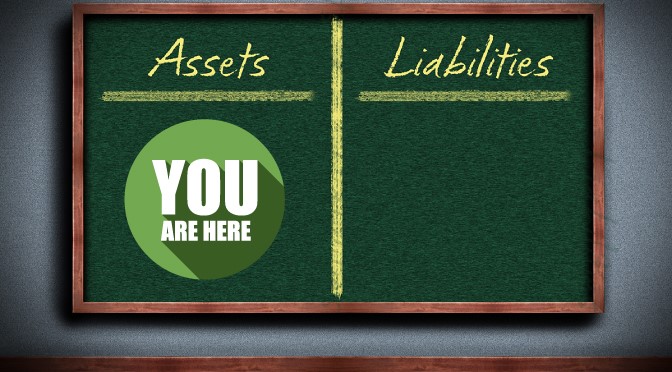Beat Stock Market Gains by first recognizing the true value of your greatest asset—your mind. Think about all the time, energy, and effort you’ve invested in earning your money. Regardless of your profession, you’re using your brain to make it happen. Your mind is a billion-dollar asset—and unless artificial intelligence surpasses human thinking, it’s the smartest tool you have at your disposal.
Yet, typical financial advice often goes against this truth: “Give me your money, and I’ll invest it for you because I’m smarter than you.” The ones who profit from the stock market want you to turn your brain off and let them do the work. At Paradigm Life, we disagree.
When you relinquish control of your financial future to the market, you’re essentially relying on the “cross-your-fingers” approach—hoping for the best, but leaving your hard-earned money subject to market fluctuations. This isn’t the best way to use your billion-dollar brain.
Even the most successful individuals can be misled by traditional financial advice. The idea that a magical kingdom of investments and returns will automatically grow your wealth without any involvement on your part is a myth. Why do people believe this? It’s simple: it’s easy, they don’t know another way, and, historically, the market has been on an upward trajectory.
A Brief History of Retirement Savings: The Shift in Responsibility
Let’s take a quick look at the evolution of retirement savings to understand why so many people rely on stock market investments. Pensions, which were popular from the 1970s to the 1990s, were designed to retain employees by offering financial security in retirement. For companies, pensions were an affordable solution compared to dealing with employee turnover (or were they?).
As pensions became costly for companies, they transitioned to defined contribution plans like 401(k)s in the mid-1970s. These plans shifted the burden of retirement savings from the employer to the employee. While 401(k)s can work when the market steadily rises, they have their flaws, especially when markets experience volatility—like we’re seeing today.
Now, the responsibility for your financial future is squarely on your shoulders. The question is, do you have the preparation you need to make your retirement savings grow, no matter what the market does?
Beat Stock Market Gains: The Paradigm Life Approach

At Paradigm Life, we want to show you how to beat stock market gains by creating a strategy that uses your greatest asset—your mind—to generate financial returns. As Albert Einstein once said, “We can’t solve problems by using the same kind of thinking we used when we created them.” So, let’s start thinking differently.
The first step is to analyze your life-value financial statement—a personal record of your income, gains, and losses. Your income is determined by the assets you’ve built, and it’s important to assess the real value of each asset.
For instance, many people view their degree as an asset, but is it truly the best one? Only you can determine that. Continual, steady education is one of the most valuable assets you can have. Never stop learning
3 Key Ways to Beat Stock Market Gains
Here are three actionable ways to increase your financial returns beyond what the stock market offers:
1. Become a Perpetual Learner
The more you learn, the more you earn. This is a fundamental principle when it comes to beating stock market gains and creating lasting wealth. By continually investing in your education, you not only enhance your skills but also open up new opportunities for higher income.
- Why it matters: Knowledge compounds, just like money. The more skills you acquire, the more income-generating opportunities you’ll be able to seize. Whether it’s mastering a new technology, learning about real estate investment, or improving your professional expertise, education pays dividends.
- How to do it:
- Self-education: Platforms like Coursera, Udemy, and iTunes University offer accessible courses that can help you develop skills to boost your earning potential.
- Networking and mentorship: Surround yourself with successful individuals who can offer guidance and support, and attend industry-specific events to expand your knowledge base.
- Apply your learning: Invest in acquiring new skills and then immediately put them into practice. This real-world application accelerates your wealth-building potential and helps you stay ahead of the curve.
- Self-education: Platforms like Coursera, Udemy, and iTunes University offer accessible courses that can help you develop skills to boost your earning potential.
By focusing on lifelong learning, you’re effectively increasing the value of your most important asset: yourself. This proactive approach ensures that you beat stock market gains by leveraging your knowledge to create consistent income streams.
2. Take Control of Your Money by Borrowing Against a Whole Life Policy
Relying on the stock market for long-term growth often means putting your wealth in the hands of volatile market conditions.
At Paradigm Life, we recommend taking control by using a whole life insurance policy that builds cash value. This cash value can be borrowed against, giving you liquidity and flexibility without the need to sell assets or take high-interest loans from banks.
- Why it matters: When you borrow from yourself, you’re in control of how your money grows, rather than relying on stock market trends or hoping for the best. With a whole life insurance policy, your money continues to grow with guaranteed interest, and you have the option to access that growth at any time.
- How to do it:
- Open a whole life insurance policy: Work with a financial advisor to choose a policy that builds significant cash value over time.
- Use your policy as a financial tool: Once you’ve built up a cash value, you can borrow against it at favorable terms, using the funds for other investments that generate more income—whether it’s purchasing real estate, starting a business, or expanding your investment portfolio.
- Reinvest: When you borrow against your policy, you can reinvest that capital into ventures that have the potential to beat stock market gains over time.
- Open a whole life insurance policy: Work with a financial advisor to choose a policy that builds significant cash value over time.
This approach allows you to maximize the growth of your wealth without exposing it to the volatility of the stock market. By using your whole life policy as a personal bank, you have access to your money while it continues to grow, giving you more power over your financial future.
3. Never Pay Interest to a Bank Again
The idea of borrowing money from a bank, paying interest, and having it affect your financial goals is frustrating, especially when you’re trying to beat stock market gains. With the right strategy, you can stop paying interest to banks altogether and leverage your money in ways that allow it to work harder for you.
- Why it matters: Paying interest on loans eats away at your potential returns. By eliminating the need to rely on external lenders, you can save more of your money and direct it toward investments that generate wealth. You can also analyze your investment opportunities more effectively, ensuring they bring in more money than they cost you.
- How to do it:
- Borrow from yourself: By using the cash value of a whole life insurance policy, you can borrow money to make investments—without having to pay high interest rates to a bank. This allows you to keep your profits intact and reinvest them for even greater returns.
- Invest in income-producing assets: Use the funds you’ve borrowed to make strategic investments, such as purchasing real estate or starting a business. The goal is to generate income that exceeds the cost of borrowing, ensuring you’re always on the winning side of the investment.
- Reinvest your profits: With the right investments, you can keep the money flowing back into your system, allowing you to beat stock market gains over time.
- Borrow from yourself: By using the cash value of a whole life insurance policy, you can borrow money to make investments—without having to pay high interest rates to a bank. This allows you to keep your profits intact and reinvest them for even greater returns.
By leveraging your own assets, you can keep your wealth-building efforts in-house, cutting out the middleman and making your money work harder for you.
The Power of Cash Flow: The Real Key to Beat Stock Market Gains

When it comes to building wealth, cash flow is king. Unlike the stock market, where you hope your money grows over time, cash flow puts money in your pocket regularly—and predictably. If your focus is to beat stock market gains, shifting your mindset from accumulation to cash flow can dramatically improve your financial results.
Why Cash Flow Beats Market Performance
Most people are trained to think in terms of net worth. But The Wealth Standard teaches that what matters most is how much money flows to you each month. This approach gives you:
- Control over your income
- Flexibility to respond to opportunities or emergencies
- Confidence that your wealth isn’t tied to market volatility
Real-World Examples of Cash Flow Strategies
To beat stock market gains, consider assets and strategies that generate steady, reliable cash flow:
- Dividend-paying whole life insurance: Builds guaranteed cash value and allows for policy loans while continuing to grow.
- Rental real estate: Produces monthly income and long-term equity growth.
- Private lending or secured notes: Offers fixed income returns often higher than average market gains.
- Business ownership: Allows you to create and scale your own income, backed by your unique skill set.
These approaches don’t rely on stock tickers or unpredictable indexes. Instead, they’re based on systems you understand, control, and can optimize for your goals.
Cash Flow in Action: A Quick Scenario
Imagine having access to $500/month in policy cash flow or rental income. That’s $6,000/year—guaranteed, predictable income. Now imagine the market drops 15% and your traditional portfolio takes a hit. Which feels more secure?
Cash flow gives you certainty. And certainty is what helps you truly beat stock market gains without the stress of speculation.
You Are Your Greatest Asset
Remember, you have an infinite amount of value between your two ears. Optimize it, grow it, and give back. At Paradigm Life, we believe the more value you create for others, the more it will come back to you.
That’s why we’re committed to your continual learning and growth. To help you get started, we’ve created a FREE, comprehensive eCourse to help you take back control of your finances. It only takes two minutes to sign up and receive access to video tutorials, articles, and podcasts—all at no cost to you.
This is your opportunity to become educated on a strategy that can help you change your wealth paradigm and start beating stock market gains. Take action today—your financial future depends on it!
Take advantage of this FREE resource by clicking below.
Frequently Asked Questions
What is one key strategy to potentially beat stock market gains?
Continuous learning and self-education are crucial for enhancing financial opportunities and making informed investment decisions.
How can whole life insurance policies contribute to financial control?
Strategically using whole life insurance policies can offer financial control and flexibility, potentially contributing to greater financial growth than traditional market investments.
What role does managing personal financial resources play in investment success?
Effective utilization of personal financial resources, such as avoiding traditional bank interest, can lead to more efficient financial management, aiding in surpassing typical market returns.
Why is cash flow more important than market performance?
While traditional advice focuses on portfolio growth, cash flow provides real-time financial power. Steady income from your assets gives you flexibility and peace of mind—especially during downturns.
It’s Time to Think Bigger Than the Market
Beating the stock market isn’t about luck—it’s about strategy. When you shift your mindset from market dependency to intentional wealth-building, you unlock the ability to beat stock market gains with greater confidence and control. By investing in yourself, leveraging whole life insurance, building cash flow, and eliminating unnecessary debt, you create a financial system that’s built to thrive—regardless of market conditions.
At Paradigm Life, we believe your mind is your most valuable asset—and with the right education and tools, you can design a future that aligns with your goals, not Wall Street’s agenda.
Ready to Beat Stock Market Gains—Your Way?
Join thousands of others who are using smarter strategies to build lasting wealth. Start your FREE Paradigm Life eCourse today and take the first step toward financial independence that doesn’t rely on the market.
Your future deserves more than hope—it deserves a plan.







